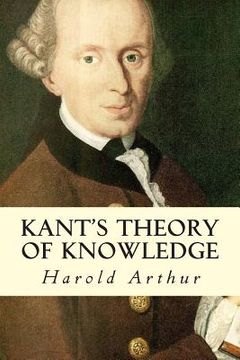Synopsis "Kant's Theory of Knowledge"
Kant's Theory of Knowledge is a classic philosophy essay that is an attempt to think out the nature and tenability of Kant's Transcendental Idealism, an attempt animated by the conviction that even the elucidation of Kant's meaning, apart from any criticism, is impossible without a discussion on their own merits of the main issues which he raises. Immanuel Kant (22 April 1724 - 12 February 1804) was a German philosopher who is a central figure in modern philosophy.[9] Kant argues that the human mind creates the structure of human experience, that reason is the source of morality, that aesthetics arises from a faculty of disinterested judgment, that space and time are forms of human sensibility, and that the world as it is "in-itself" is independent of humanity's concepts of it. Kant took himself to have effected a "Copernican revolution" in philosophy, akin to Copernicus' reversal of the age-old belief that the sun revolves around the earth. Kant's beliefs continue to have a major influence on contemporary philosophy, especially the fields of metaphysics, epistemology, ethics, political theory, and aesthetics. Politically, Kant is one of the earliest exponents of the idea that perpetual peace could be secured through universal democracy and international cooperation. He believed that this will be the eventual outcome of universal history, although it is not rationally planned.[10] The exact nature of Kant's religious ideas continues to be the subject of especially heated philosophical dispute, as viewpoints are ranging from the idea that Kant was an early and radical exponent of atheism who finally exploded the ontological argument for God's existence, to more critical treatments epitomized by Nietzsche who claimed that Kant had "theologian blood"[11] and that Kant was merely a sophisticated apologist for traditional Christian religious belief, writing that "Kant wanted to prove, in a way that would dumbfound the common man, that the common man was right: that was the secret joke of this soul."[12] In one of Kant's major works, the Critique of Pure Reason (Kritik der reinen Vernunft, 1781), [13] he attempted to explain the relationship between reason and human experience and to move beyond the failures of traditional philosophy and metaphysics. Kant wanted to put an end to an era of futile and speculative theories of human experience, while resisting the skepticism of thinkers such as David Hume. Kant regarded himself as ending and showing the way beyond the impasse which modern philosophy had led to between rationalists and empiricists, [14] and is widely held to have synthesized these two early modern traditions in his thought. Kant argued that our experiences are structured by necessary features of our minds. In his view, the mind shapes and structures experience so that, on an abstract level, all human experience shares certain essential structural features. Among other things, Kant believed that the concepts of space and time are integral to all human experience, as are our concepts of cause and effect.[16] One important consequence of this view is that our experience of things is always of the phenomenal world as conveyed by our senses: we do not have direct access to things in themselves, the so-called noumenal world. Kant published other important works on ethics, religion, law, aesthetics, astronomy, and history. These included the Critique of Practical Reason (Kritik der praktischen Vernunft, 1788), the Metaphysics of Morals (Die Metaphysik der Sitten, 1797), which dealt with ethics, and the Critique of Judgment (Kritik der Urteilskraft, 1790), which looks at aesthetics and teleology.

